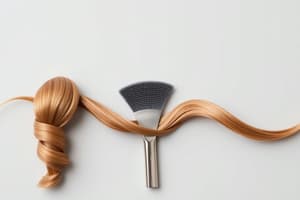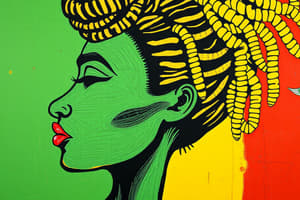Podcast
Questions and Answers
What are acid-balanced waves?
What are acid-balanced waves?
- Cold waves with a pH between 9.0 and 9.6
- Waves that require added heat to process
- Waves that produce firmer curls than true acid waves (correct)
- Permanent waves with a pH of 7.0 (correct)
What type of waves are also known as cold waves?
What type of waves are also known as cold waves?
- Ammonia-free waves
- Alkaline waves (correct)
- True acid waves
- Acid-balanced waves
What are amino acids?
What are amino acids?
Compounds made up of carbon, oxygen, hydrogen, nitrogen, and sulfur.
What are ammonia-free waves?
What are ammonia-free waves?
What is ammonium thioglycolate (ATG)?
What is ammonium thioglycolate (ATG)?
What does base control refer to?
What does base control refer to?
What is base cream also known as?
What is base cream also known as?
What is a basic permanent wrap?
What is a basic permanent wrap?
What is the purpose of end papers in perming?
What is the purpose of end papers in perming?
What are hydroxide relaxers?
What are hydroxide relaxers?
What is the function of normalizing lotions?
What is the function of normalizing lotions?
What defines the term viscosity?
What defines the term viscosity?
What is the double-rod wrap technique?
What is the double-rod wrap technique?
What occurs during hydroxide neutralization?
What occurs during hydroxide neutralization?
Flashcards
Acid-balanced permanent wave
Acid-balanced permanent wave
A permanent wave with a neutral pH that yields firmer curls at room temperature.
Alkaline permanent wave
Alkaline permanent wave
Cold waves using ammonium thioglycolate (ATG) at a pH of 9.0-9.6.
Ammonium thioglycolate (ATG)
Ammonium thioglycolate (ATG)
Active ingredient in alkaline permanent waves.
Basic perm wrap
Basic perm wrap
Signup and view all the flashcards
Croquignole perm wrap
Croquignole perm wrap
Signup and view all the flashcards
Chemical hair relaxing
Chemical hair relaxing
Signup and view all the flashcards
Hydroxide relaxers
Hydroxide relaxers
Signup and view all the flashcards
Base control (perms)
Base control (perms)
Signup and view all the flashcards
Viscosity
Viscosity
Signup and view all the flashcards
End papers (perms)
End papers (perms)
Signup and view all the flashcards
Bricklay perm wrap
Bricklay perm wrap
Signup and view all the flashcards
Double-rod wrap
Double-rod wrap
Signup and view all the flashcards
Spiral perm wrap
Spiral perm wrap
Signup and view all the flashcards
Study Notes
Permanent Waves
- Acid-balanced waves: Permanent waves with a neutral pH (7.0), process at room temperature, yielding firmer curls.
- Alkaline waves: Known as cold waves, they have a pH of 9.0-9.6 and use ammonium thioglycolate as a reducing agent.
- True acid waves: pH between 4.5 and 7.0, requiring heat for processing, producing softer curls compared to alkaline waves.
Core Components in Chemical Processes
- Amino acids: Building blocks of proteins containing carbon, hydrogen, oxygen, nitrogen, and sulfur.
- Ammonium thioglycolate (ATG): Active ingredient in alkaline permanent waves.
- Glyceryl monothioglycolate (GMTG): Main active ingredient in true acid-balanced waving lotions.
- Keratin proteins: Long coiled chains that form the structure of hair.
Perm Techniques and Terminology
- Basic permanent wrap: All rods within a panel move in the same direction, positioned on equal-sized, horizontal bases.
- Croquignole perm wrap: Wrapped from ends to scalp in concentric layers, producing a defined curl.
- Bricklay permanent wrap: Rods are offset in rows, blending hair flow and reducing visible splits.
- Double-rod wrap: Involves wrapping hair on two rods, accommodating longer hair length.
- Spiral perm wrap: Hair wrapped at an angle to create spirals, similar to candy cane stripes.
Relaxers and Treatments
- Chemical hair relaxing: Rearranges curly hair into a straighter form.
- Hydroxide relaxers: Strong alkalis with pH over 13; active ingredient is the hydroxide ion.
- Thio relaxers: Use ATG at a higher concentration for relaxing hair.
Application Techniques
- Base control: Determines the position of the rod based on the angle hair is wrapped.
- End papers: Absorbent papers used to manage hair ends during wrapping.
- Base placement: Position of the rod in relation to the base section to control curl alignment.
- Off-base placement: Wrapped at a 45-degree angle, positioned completely off its base.
- On-base placement: Wrapped at a 45-degree angle beyond perpendicular, directly on the base.
Chemical Reactions and Effects
- Hydroxide neutralization: Neutralizes alkaline residues from hydroxide relaxers, restoring pH.
- Thio neutralization: Stops permanent wave solution action, helping rebuild hair structure.
- Viscosity: Measurement of liquid thickness, influencing how a solution flows during application.
Specialized Terms
- Loop rod: Rod with a uniform diameter, about 12 inches long.
- Soft curl permanent: Combines a thio relaxer with a thio permanent to enlarge existing curls.
- Low-pH waves: Use alternative reducing agents like sulfites; have a low pH.
- No-base relaxers: Do not require protective base cream during application.
- Weave technique: Zigzag partings to divide base areas for wrapping.
This compilation summarizes essential vocabulary and concepts from cosmetology focused on chemical texture services, perm techniques, and hair relaxing processes.
Studying That Suits You
Use AI to generate personalized quizzes and flashcards to suit your learning preferences.




